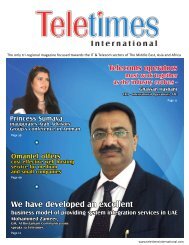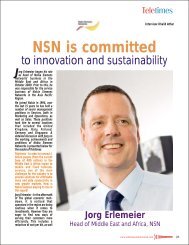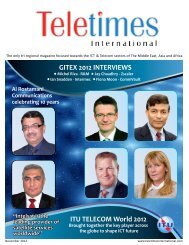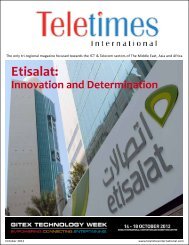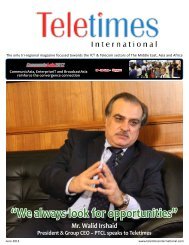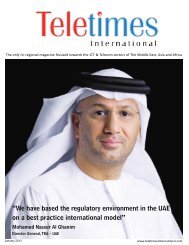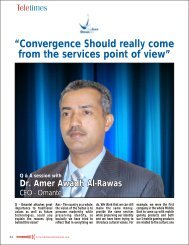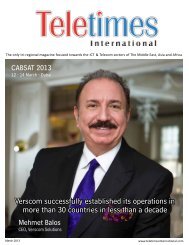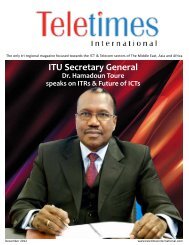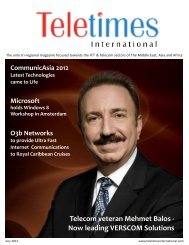Teletimes April 2011.pdf
Teletimes April 2011.pdf
Teletimes April 2011.pdf
Create successful ePaper yourself
Turn your PDF publications into a flip-book with our unique Google optimized e-Paper software.
Measured approach<br />
On the surface, STC Group’s<br />
most recent set of financial<br />
results appeared to typify the<br />
fortunes of most incumbent<br />
telecom operators that have seen<br />
their home markets eroded by<br />
tough competition.<br />
In its Q4 2010 results, STC<br />
posted a 23% decline in net<br />
profit to SR2.29 billion ($610.7<br />
million). STC’s operating profit<br />
rose 15% to SAR3.03 billion, but<br />
its full-year net income declined<br />
by 13% to SAR9.4 billion.<br />
However, the results were<br />
generally in line with analyst<br />
expectations, and as STC said in<br />
its results statement, the sudden<br />
fall was also related to a one-off<br />
gain in Q4 2009, which resulted<br />
from the listing of STC’s Malaysian<br />
joint venture, Maxis Group.<br />
STC also said that its 2010 profit<br />
fell due to an increase in costs<br />
related to capital investments in<br />
Saudi Arabia and abroad.<br />
STC’s explanation of the results<br />
appears to hold some weight.<br />
The operator has certainly faced<br />
some significant costs after<br />
launching mobile operations<br />
from scratch in Kuwait at the<br />
end of 2008, and in Bahrain in<br />
March 2010.<br />
“The dip in the home market was<br />
a top-line dip,” says Ghassan<br />
Hasbani, CEO, international, STC.<br />
“If you look at the bottom-line<br />
issue, there is not a dip.”<br />
“The cost efficiency programmes<br />
that have been run at STC have<br />
actually brought a positive<br />
impact on the financials so it<br />
has been a positive story, not a<br />
negative story.<br />
“The question is one of net<br />
income. If you look at the size of<br />
STC and the dividend and payout<br />
ratio and you look at the scale<br />
of infrastructure it has globally,<br />
we are more skewed towards<br />
Ghassan Hasbani<br />
CEO STC International<br />
investments in long-term growth<br />
markets, so this is where the<br />
money is still going.”<br />
Hasbani insists that the positive<br />
impact of international operations<br />
on profitability will take<br />
some time, possibly two to<br />
three years. However, STC’s<br />
international forays in the past<br />
few years, which have seen the<br />
telco gain a presence in India,<br />
Indonesia, Malaysia, Turkey and<br />
South Africa, as well as Kuwait<br />
and Bahrain, are already having<br />
a positive effect on revenues.<br />
“The positive income in terms<br />
of total revenue growth is there<br />
already. It is already pushing<br />
revenues significantly,” he says.<br />
“Most of the investments have<br />
already gone into the ground, so<br />
it now is a time of incremental<br />
capacity and sweating the assets,”<br />
he adds.<br />
Bahrain and Kuwait<br />
And two of the main assets that<br />
STC is busy nurturing are its<br />
mobile operations in Kuwait and<br />
Bahrain. STC acquired Bahrain’s<br />
third mobile licence back in<br />
March 2009, for about $240<br />
million, and launched operations<br />
last March. Hasbani says the<br />
operation has “proven a good<br />
success” in its first year of operations.<br />
Hasbani describes the situation<br />
in the highly penetrated<br />
Bahraini market, where Viva<br />
competes with Batelco and Zain,<br />
as being a “value war”.<br />
Despite a mobile penetration<br />
rate of well-above 100% and a<br />
population of little more than 1<br />
million people, Hasbani insists<br />
that Viva has significant growth<br />
potential.<br />
“If you look at our pricing<br />
structure, it is not extremely low,<br />
but it is at the right level with<br />
the benefits that you get out of<br />
it, because we don’t have any<br />
legacy systems on the network.<br />
We were able to create a lot of<br />
value and we are still creating a<br />
lot of innovative products and<br />
services and packages that offer<br />
a lot of value for the money that<br />
you pay for them,” he says.<br />
At the beginning of February,<br />
Viva Bahrain secured funds for<br />
infrastructure expansion and<br />
general costs after it signed a<br />
$280 million financing agreement<br />
with HSBC Bahrain and<br />
Samba, a Saudi Arabian bank.<br />
Hasbani says the agreement<br />
represented a “very good deal”<br />
and that by arranging most of<br />
the agreement in dollars, Viva<br />
Bahrain was able to secure a low<br />
interest rate.<br />
“We are deploying infrastructure<br />
anyway, and Viva is still in<br />
growth mode so it is effectively<br />
being used to fund the entire<br />
operation. “This is a long term<br />
funding so it will help the company<br />
until the cash situation is<br />
sustainable and self sufficient,<br />
so we don’t envisage any further<br />
major funding rounds beyond<br />
this,” he adds. Meanwhile, Viva<br />
Kuwait also remains in “growth<br />
mode” and is expected to become<br />
profitable in 2010, according<br />
to Hasbani.<br />
“We already have a good traction<br />
on subscriber and revenue<br />
growth. Kuwait and Bahrain<br />
are similar stories, with steady<br />
Roger Field<br />
STC Group started its international expansion later than some of its regional peers,<br />
but the Saudi incumbent is poised to reap the rewards of its recent investments<br />
growth and a good cost management<br />
approach, because they<br />
are both lean, small operations,”<br />
he says. Across its operations,<br />
Hasbani says that “promised new<br />
revenue streams” are also starting<br />
to emerge from “phenomenal”<br />
broadband growth.<br />
“We have been investing in<br />
broadband, DSL and fibre and<br />
now we are starting to reap the<br />
benefits where we are experiencing<br />
actual growth on revenues<br />
in this sector. That is significant<br />
and is starting to compensate for<br />
certain diminishing revenues on<br />
traditional services,” he says.<br />
Market dynamics<br />
In terms of further opportunities<br />
in the Middle East, Hasbani<br />
points to Syria, where STC is one<br />
of five companies bidding for the<br />
country’s third mobile licence,<br />
which is understood to have a<br />
reserve price of EUR90 million<br />
($122.7m).<br />
Speaking generally about opportunities<br />
in the region’s telecom<br />
sector, Hasbani says further<br />
acquisition targets are likely to<br />
present themselves in 2011, as<br />
some larger private investors<br />
seek to cash in on the rising<br />
value of telecom assets.<br />
“As long as they [PIs] are at the<br />
end of the cycle and they see<br />
this [telecoms] as the only sector<br />
they can exit at a good price,<br />
then we will see more of them<br />
exiting to cover other sectors<br />
that they have invested in,” he<br />
says.<br />
“I see that happening in the next<br />
couple of years, with large PI<br />
owners of telecom assets. There<br />
is also more appetite to come<br />
into the sector and invest in telecoms,<br />
and we are seeing large PI<br />
groups eyeing up telecoms again<br />
because it is the only thing they<br />
can sell to others. T<br />
15Apr - 14May 2011<br />
www.teletimesinternational.com<br />
31



